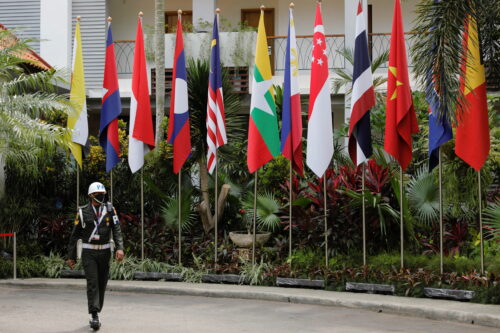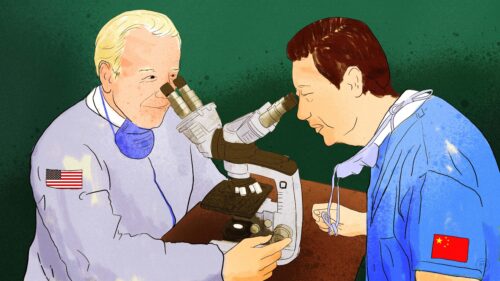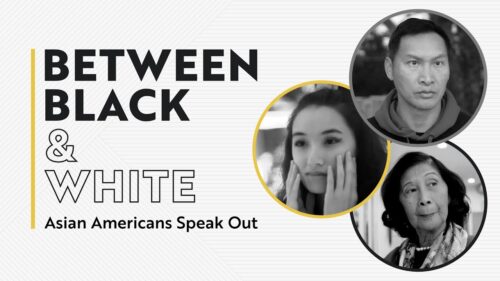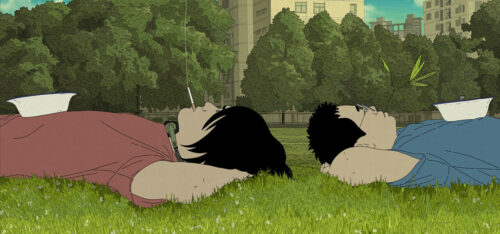Freedom in Dissent
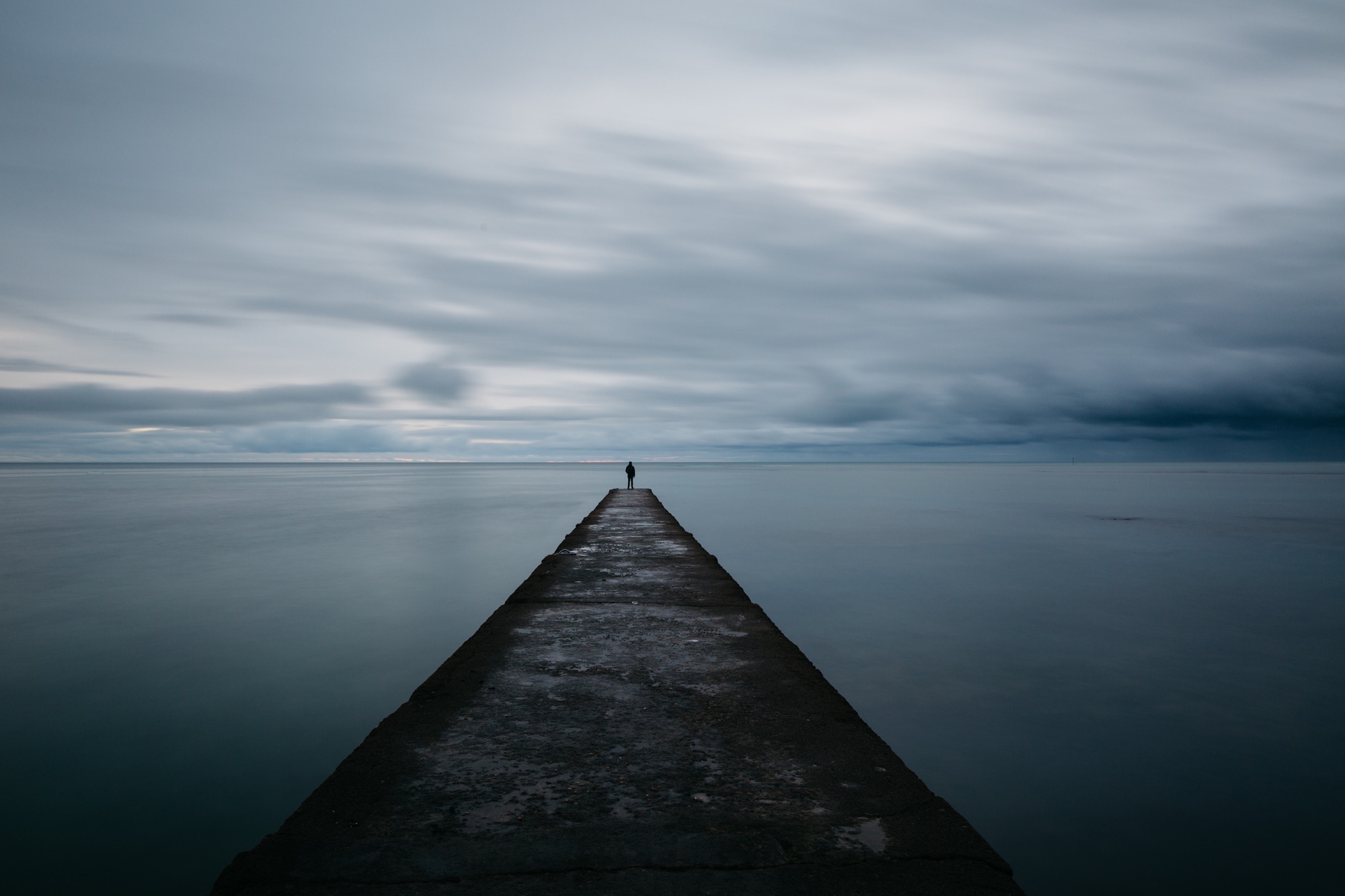
As protests rage in Hong Kong, Yangyang Cheng thinks about her own experience with expression and dissent.
![]()
“Are you the child of a high-level Chinese official?”
I had just sat down in the audience for a public lecture when a friendly stranger approached me with this question. At first I thought it was a case of mistaken identity, but then he said my name and that he had read one of my articles.
It was the spring of 2018. As a Chinese scientist living and working in the U.S., I had just begun writing in my adopted tongue. The essay he mentioned was my first published piece about my birth country, specifically about the political implications of a proposed scientific experiment. Considering the esoteric nature of the subject, I was surprised by its wide readership, again evident from this encounter.
No, I responded, somewhat bemused. I grew up in the provinces, and my folks were teachers. Political power was as remote to my upbringing as a foreign land.
“But in your article, you were very critical of the Chinese government,” explained the stranger. A veteran China watcher, he had made the educated guess that for a Chinese person to say certain things, let alone publicly, she must come from a privileged position with political protection.
After I assured him that I did not, he asked me if I understood the risks.
In my article, I described the Chinese government’s authoritarian nature and its restrictions on academic freedom. If I was clear-eyed about the grand scheme of things, did I think through the article’s implications on an individual level — namely, for me?
I thanked him for his kind concern, but, “I write what I believe in,” I replied. For the process to be intellectually honest, political repercussions could not be part of my calculation.
The talk was about to start. As he walked back to his seat two rows in front of me, my new acquaintance turned around and said three characters in Chinese: “胆子大” (dǎnzi dà) — you have guts.
![]()
I left China in the summer of 2009 for graduate school in the U.S. A few days before my departure, my extended family gathered for dinner at a local restaurant. Between bites of stir-fry and fish stew, my uncle put down his chopsticks, looked me in the eye, and said, “Yangyang, you are free.”
“No, she is not!” my mother was quick to object.
Among the many things I would learn about my birth country from outside the Great Firewall, one of the first was the student protests in the spring of 1989. On the 21st anniversary of the bloody crackdown, I posted an image of candlelights on my Facebook page.
“Be careful! You might get invited for tea the next time you go back (to China),” a Chinese friend warned in a comment. He too was studying in the U.S.
I wanted to tell him that he was paranoid. I appreciated his concern, but part of me was frustrated that he tried to restrict my free expression, unwittingly helping the Chinese government exert control beyond its borders.
Yet a voice inside me refused to stay quiet: “What if?” And what tangible outcome could my small gesture of commemoration bring? Compared with the possibility of personal harm, however faint, was it worth it?
Growing up in China, I was taught that politics was taboo. “Do not mention matters of the government,” my mother told me. Her maternal worries compounded by the ocean between us, she had been messaging me a constant stream of advice: “Never criticize China because you are Chinese.” “Never criticize America because you are a guest in another person’s house.”
Life as an immigrant always carries a probationary quality. With no birthright claim to the land, a newcomer walks carefully along the paths most traveled, fearful that any deviation might cause their whole world to crumble. How much of a cocoon must I construct to protect the fragility of my status, after the completion of a transpacific flight?
The China I bid goodbye to a decade ago was not free, but it bubbled with hopes for a better path, enabled by a growing economy, a relatively moderate government, emerging social media platforms, and grassroots activism around local issues. Over the past several years, the Party, aided by new technology, has tightened its grip on all aspects of Chinese society. It is one among many examples of rising ethno-authoritarianism across the globe, but arguably the most consequential.
I had run away once from the land of my birth, but as the world was burning on so many fronts, sometimes literally, escaping was no longer an option. Keeping my head down and my mouth shut in the hopes of riding out the storm felt like a betrayal of life itself, or the act of living, and a dereliction of my civic duty. I decided gestures — even small ones on social media — were important.
When I sat down to write my first article on China, to be published in a U.S. magazine, I felt the clock slowing with each pressing of the keyboard. I wrote about how the Chinese government sees science as a tool of national greatness and leverages its economic might to bend the free world to its will. I had considered myself a fast writer on the subject of physics, but this time the words came slowly, drip by drip, from a rusty faucet that never knew the thrill of an uninhibited flow; perhaps it had forgotten that it was connected to a well, that it had thoughts, that it deserved a voice.
In the solitude of my office and the depth of night, I wrote, and a cage shattered around me.
![]()
“Do you fear for repressive measures against you or your family members in China after your article and this interview?” a reporter asked at the end of our hour-long conversation. His magazine was doing a profile of me after my article on science and political freedom in China was published. He confessed his hesitation in raising this personal issue, and emphasized that I should not feel obliged to respond.
I had anticipated this question beforehand, not so much in preparation for the interview but to assuage my own anxiety. I had repeated the same lines to myself so many times that my answer sounded regimented, taking on a pretense of clarity when there was none. I acknowledged my estrangement from my immediate family in China for complicated personal reasons, and it was my hope that such distance would offer them protection. Potential consequences to myself were my personal responsibility. “Freedom always comes at a cost, but the cost of not exercising that freedom is always much greater,” I concluded in my reply. It was a powerful sentence, almost like a slogan, a neat bow tying up a mess of emotions.
In the time since the interview, I have continued to write on China, grateful for the opportunities to share my thoughts. When people tell me I’m brave, I am humbled, but always uncomfortable. What have I done to deserve it? Only when people default to silence in the face of injustice does speaking one’s mind become an act of courage.
“You are a good child and you have a strong sense of right and wrong,” my mother wrote me in an email. She had heard from a family friend about one of my articles. I did not know the details, and felt better not to ask.
My mother does not speak English. As a young adolescent in China, I was surprised to wake up one day and recall that I dreamt in halting, fragmented Roman letters. Eventually it became a regular occurence, with improved fluency. Perhaps my subconscious spoke in English, so that my thoughts would be safe from my mother. Now I write in English. The foreign tongue gives me a platform outside the reach of Chinese censorship, and protects my mother from my seditious words.
“I am sorry for treating you the way I did, which made you how you are today,” my mother said. In her eyes, I was always a difficult child, opinionated, indomitable. Was my rage against societal ills only part of a surrogate rebellion against my mother?
I tell my mother that I have never blamed her. I make my own choices for my own reasons. I am an adult who lives an ocean away. My life should not be her burden, nor my risks her punishment.
Yet I often wonder what I might have done differently if I had a closer relationship with my mother, if my father were still alive, if I had children or other loved ones to provide for. What kind of person makes hypotheses about her own family in risk analysis, as an academic exercise?
In an unfree world, to live freely is the loneliest, most selfish act.
![]()
“You are a radical!” a senior scientist who I had never spoken to before exclaimed as the elevator opened, a big smile on his face. I stepped in, he walked out. Seeing my bewilderment, he added as the door slid shut, “I read your article! How many countries are you banned from now?”
People tell me that they admire how outspoken I am, that not many scientists are, let alone the ones from China. I do not know whether I take that as a compliment, though I understand they mean well. I am an ordinary person. My life is not a spectacle. The daredevil performing a high-wire act can provoke a sense of envy in the observer, but were the unimaginable to occur, the audience would feel pity and sorrow, and for many, also a guilty sense of relief: “Thank God I didn’t try that!”
On many nights when I was still living in China, my mother and I would repeat the same argument: for whom was it safer to run an errand by herself after dark? My mother insisted that an old woman like herself was undesirable and hence invisible to lurking eyes.
“But I’m tall!” My height brought unwanted attention, but it also gave me a primal sense of security.
Each time I acquire a new byline or finish a media interview, when the subject is deemed sensitive in China, I think about the dual effects of visibility: the vulnerability from exposure, and the illusion of empowerment. Should I write anonymously? Should I speak on background? I recognize the value of credibility attached to a real name. But name recognition alone is no protection against nefarious individuals or forces of a state.
“If you got kidnapped and put on a plane back to China, I would lay down on the tarmac to stop it!” my dearest friends tell me. “If you went to jail in China, I will go to Tiananmen Square with a sign, ‘Free Yangyang!’” It is very sweet, and we laugh.
I indulge myself on dark humor, an effective antidote to fear. Yet afterwards, there is the shame of self-aggrandizement. The hyperbole feeds my ego, but there’s an element in our jokes that is also someone else’s reality. So many have suffered for the cause of freedom. Who am I to appropriate their sacrifices for my comic relief?
![]()
I froze in awe as the pale young man walked towards me. “Hi, I’m Vladimir.” He extended his hand. I shook it reflexively without saying a word. When I finally broke out of my trance, Vladimir V. Kara-Murza had taken his seat in the front row of the theater.
Kara-Murza was at my university for a screening of his documentary Nemtsov. The hour-long film tells the life and career of Boris Nemtsov, the physicist-turned-politician and former deputy prime minister of Russia, assassinated in 2015 for his fierce opposition to the Putin regime.
A journalist and historian by training, Kara-Murza served as a top aide to Nemtsov, and was deputy leader of the liberal People’s Freedom Party. Poisoned in Moscow in 2015 and again in 2017, Kara-Murza had recovered and returned to work, his lawyers’ requests for a police investigation of the incidents rejected without explanation.
I wept at the end of the powerful film, the recency of Nemtsov’s death and his physics background carrying particular resonance. At the post-screening reception, I told Kara-Murza how much his former boss’s story had meant to me, as a physicist from China. I fumbled with finding the appropriate words, feeling presumptuous for inserting myself into Nemtsov’s legacy of ultimate sacrifice. But Kara-Murza was gracious, and we spoke some more about the political conditions of our home countries.
The August Coup of 1991 was mentioned in the film, when the people of Moscow took to the streets and stood against tanks. The military retreated and the plot failed. Not long after, the Soviet Union collapsed as well.
Kara-Murza said he was too young to attend the protest himself, but his father was there all three days and three nights. The elder Kara-Murza, who passed away recently, never worked officially in the Soviet era, as a conscientious objection against the totalitarian state.
“The Russian military won’t shoot the Russian people. Even Putin knows that today,” he said.
“But we know what happened in Beijing in 1989.”
“Yeah.”
I sensed a swell of grief swallowing me, my chest heavy, my legs light. There is no liberty in death. What is the acceptable degree of collective sacrifice?
“When the people have never lived in freedom, how do you convince them what they are missing is worth fighting for?” I asked.
“But in Russia we had freedom,” Kara-Murza responded. “After the fall of the Soviet Union, for a brief period of time we were free.”
People were lining up behind me. I felt embarrassed for my greediness. I said a quick thank you and left the room. I had taken up so much of Kara-Murza’s time, indulging in my own adulation of him and his late boss, with little regard for his feelings. I had pressed him with questions about my own country. How childish of me to think that he should provide me with an answer, some divine wisdom to my earthly struggle. That a man has faced death for his cause and survived does not make him any less mortal.
From time to time, there will be a comment online to my writing accusing me of hypocrisy, saying if I truly cared about democracy and human rights in China, I should “go back and fight.” Is there not a kernel of truth there? I am not a martyr and do not wish to be one. I am not an organizer or politician like Kara-Murza. I am a scientist and a writer. The only person I have attempted to liberate is myself.
“We’ve known for a long time it’s a dangerous vocation,” Kara-Murza said in an interview with the political strategist David Axelrod. Kara-Murza explained that he had moved his family to the U.S. for their safety, “I have the right to risk myself. I don’t have the right to risk my family.” But the opposition leader continued his work in his homeland, partly because he hoped his children could “go back to a free and democratic Russia.”
“What precautions do you have to take when you are in (Russia)?” Axelrod asked.
“Not much,” Kara-Murza answered. “I can’t not eat, not drink, not breathe. The only practical thing I can do is to have my family outside of Russia. That’s the only thing.”
![]()
“I may not live to see our glory / but I will gladly join the fight.” A young protester in Hong Kong raised a placard with these words. The former British colony was handed over to China in 1997 with the promise of political autonomy and continuing its way of life for at least 50 years. While its long-term future remains uncertain, Hong Kong has been under increasing pressure from Beijing in recent years, its freedoms and rule of law squeezed by the red overlord. This summer, pro-democracy protests erupted on the island, instigated by an ill-advised extradition bill, and further inflamed by incidents of police violence.
Millions participated in peaceful demonstrations. Thousands stayed in the streets, occasionally deploying more radical measures including storming the legislative building and disrupting air travel. As tensions with law enforcement escalate and Chinese troops gather in the neighboring city of Shenzhen, I find myself watching anxiously from the other side of the planet, daring not to imagine what might come next.
When I saw the photo of the protest sign shared on Twitter, tears burst out of my eyes. The words were from a song in the Broadway musical Hamilton. Titled “The Story of Tonight,” it happens on the eve of the American Revolution, as Alexander Hamilton and his comrades-in-arms raise a glass to freedom, “something they can never take away.” The men were going to war. I wondered about the young woman who held the sign: Was she also willing to die for her beloved city?
Many in mainland China and elsewhere have been dismissive of the protest’s ideals. While economic anxiety and ethnic strife contribute to the movement, the people of Hong Kong are fighting for the survival of a collective identity that is distinct not because of the color of one’s skin or the birthplace of one’s ancestors, but the sharp contrast between two political systems. If any of the protesters’ rhetoric or actions have appeared extreme, it is a reflection of the brutal nature of the Chinese state that has raised the stakes and caused the despair.
“Do you think China will become free?” many non-Chinese friends ask me, a question I never know how to respond to. Yes, I believe that the Chinese people will one day be free, as I believe all people will one day be free, as I believe in rising oceans and changing tides, as I believe in the laws of gravity, the arrow of time, the expanding cosmos and the death of stars. But it is not a prediction, because I do not have a roadmap. For a better answer to my country’s future, I have sought out books on liberation struggles, in history and across the world, and the only consistency I could find was the burden of the process, with no guarantee of outcome.
“I do foresee the Communist Party fading. How it will happen I’ve not got the slightest idea,” said the late, great sinologist Roderick MacFarquhar in a 2017 interview. “Whether it will disappear by some kind of new revolution or just gradually fade away, I don’t know.”
When I had just arrived in the U.S., a classmate asked me if I planned to go back to China. “Only when she becomes a democracy!” I declared in youthful arrogance. In my naive mind, freedom was the treasure on the other side of the rainbow, the path a one-way street. But freedom is not a gift; it is not found or bestowed. Freedom is a state of mind, a means of existence. Being free is the lightest of feelings, and defending it can be the heaviest of burdens.
On the 30th anniversary of the Baltic Way, when two million residents in the Eastern Bloc formed a human chain in advocacy for freedom from Soviet occupation and totalitarian rule, more than a hundred thousand people linked arms and joined hands in Hong Kong. From the height of Lion Rock to the storefronts of Causeway Bay, the demonstrators lit up the night sky with their cell phones and sang “Boundless Ocean, Vast Sky,” by the iconic local band Beyond.
“Forgive me for being wild all my life, loving freedom without restraint,” the chorus went.
I too fear that I’ll fall.
Anyone can give up on their dreams,
But I’ll stick to mine
Even on the day when it’s just you and me.
Yangyang Cheng and the Science and China Column will return on the final Wednesday of every month. Last month:
